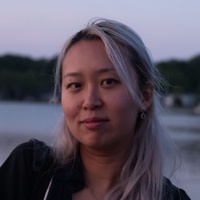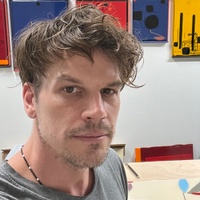On being a sensitive person
Prelude
Sedona makes mirage pop and pageant rock in Brooklyn and Los Angeles, the two places she’s called home. Her debut album, Getting Into Heaven, builds on the momentum of Rearview Angel, her 2020 EP, favoring confessional lyrics and nostalgic instrumentation inspired by pop rock and Americana touchstones à la Bonnie Raitt, Laura Nyro, and Stevie Nicks.
Conversation
On being a sensitive person
Musician Sedona discusses staying present, being raised by musicians, and incorporating the full spectrum of her emotions in her work.
As told to Shy Watson, 1870 words.
Tags: Music, Family, Beginnings, Inspiration, Collaboration.
Before reading your press release, I had never heard the term “mirage pop.” I’m curious what this means to you. Can you describe it, as well as your sound at large?
When I was thinking about my sound in the context of pop culture and music and sub-genres, I feel like it’s pop at its heart, but there’s more rock-leaning songs and there’s more pop-leaning songs. So, I sort of went with this desert-inspired pop, sort of “pageant rock.” I used to call my music “hair salon pop” because it sounds like something from a time before, but it has this contemporary context because of the production. And I’m in my 20s, so I’m not some Bonnie Raitt from the ’70s. When trying to talk about my own music, which is difficult to begin with, “mirage pop” is the phrase that came to mind.
I love it.
Sort of like a dusty pop… I also created “pageant rock” to describe my music because it’s like pageantry, like rock for girls.
Sedona of course brings to mind the desert town in Arizona. Did you come up with the name first and then the music followed, or did you come up with the name to match this dusty, desert-y music that you’ve made?
The name first, and the music followed. My earliest memory is in Sedona. When I was a kid—I think I was 2 or under 2—I watched a horse slip on a rock crossing this river. We were camping and I remember watching and feeling scared. It was my first memory, my first time experiencing fear. And it was actually the only real memory I have of my parents together, because they divorced when I was three. So yeah, the place holds a lot of spiritual memory for me.
And both your parents are musicians, right?
They are musicians. My dad’s a piano tuner, and he used to play around in Michigan in the ’70s and ’80s. And then my mom is a songwriter who was playing around Hollywood in the ’80s. But once a songwriter, always a songwriter.
How did their own musical careers or passions influence yours, if at all?
They’ve always been really supportive of me pursuing music, and I grew up with a very musical household—records always playing, jams always happening, and they were taking me to concerts before I was 1 years old. I definitely grew up with music constantly. It’s been pretty much the only constant.
I’m envisioning you in a BabyBjörn at a rock concert.
Totally. They were taking me to Steve Miller and ZZ Top when I was literally three months old, four months old.
The pigs and chickens in your “Best Kept Secret” music video were fun. What inspired their inclusion?
I was raised in Chatsworth, California, which is this sort of weird cowboy town in the Valley. I grew up surrounded by animals, in the mountains, in nature. So, for my record, I shot most of my videos and all the art in my hometown. And then for the pigs and the goats, I grew up around pigs and goats and that photo shoot happened at an animal sanctuary—not in Chatsworth, but near Chatsworth. I wanted to get a lot of pastoral sort of imagery, because In my journey of being a woman and being a chick, I feel like there’s something really resonant for me with nature and animals. Something that makes me feel in touch with myself. Maternal nature connects to nature at large.
That reminds me of what you said earlier about “pageant rock” as being rock for girls. Can you expand on that? Why is it important to you to be for girls?
I feel like my music’s for everyone, but definitely my songs are more lyrically vulnerable and on the more sensitive side. I think that sensitivity and vulnerability kind of connects to those more femme parts that society has boxed in with being a woman. I work through my emotions in my songs. This record is a testament to that, and has really helped me process a lot of things. I’m just grateful that I have music to do that.
Your music just feels really good to listen to. Is this something that you consider when you’re songwriting?
When I’m songwriting, I’m never really thinking about what I want it to sound like, which is why I have such a wide variety of sounds. I sort of am a conduit to the song. Because I listen to so many different types of music, I’ve never been one to be like, “Okay, I want my music to have X, Y, and Z; I want it to sound like this; I want it to be like that.” I just write the song and then, depending on who I’m producing it with or who I’m collaborating with, I just let it unfold. Each song of mine really has a life of its own.
As I’ve songwritten more and more over the years, I’ve gotten to know what feels most authentic to me. I think that is music that’s simpler, [that has] guitar or bass drums, kind of more of a live feel. If you look at my catalog and the history of my songs, they started off really thick and full. Now I’m stripping back each time I write a song. Each time I get into the studio and produce a song, I just want less and less.
At what point do you bring in collaborators?
It depends on the song for me, and the day. I’m not a very routine-based person, but I do write every day. So whether that’s me at the piano or me with a friend, I like to bring people in pretty much immediately. I really do enjoy songwriting with another person. But more recently I’ve enjoyed songwriting alone, me at the piano and just building out songs at the piano alone. But I think the through-line of anytime I collaborate is I’ll often begin with lyrics and melody, a capella.
I know that you also sing for Drugdealer, and I’m curious what some of the main differences are between working on your solo project versus working with the band.
I honestly feel like they’ve both informed each other a lot. When I’m singing in Drugdealer, I have more fun. Just because when I’m singing my own music, it’s so revealing and confronting for me… It just brings up more emotions. Whereas when I’m singing in Drugdealer, I’m singing someone else’s songs and I get to really be someone else. I mean, that’s not necessarily true. I’m myself in either situation, but it’s much lighter. So, I think that the lightheartedness of singing in Drugdealer really inspires me to bring that into my own project when I’m performing.
How do you define success? And what about failure?
I think success is being able to wake up and make something, no matter where you are or how you’re feeling. That feels like a win. Just no matter where you or things are in life, just being able to tune into that deeper part of yourself through songwriting.
Failure is an interesting word… I think failure is being disingenuous about how you’re actually feeling and dishonest with yourself about the parts you want to share.
When you say that success is being able to get up and work on your practice no matter what, do you have anything that’s made that easier for you?
I think it’s just kind of specific to me because I’m someone who doesn’t do well in silence. I think listening to your body is a lifelong exercise. And so for me, just getting it out onto the page, whether I’m in a good mood or a bad mood, really helps me in all sorts of ways.
I only write poetry when I’m sad, so I don’t have any happy poems. If you’re dedicated to creating something every day, then it will probably have the full breadth of your experience and range of emotions baked into it.
Yeah, songwriting for me is where I’m able to have that full range of emotion. As I get older, I’m trying to be more in touch with my harder feelings, more difficult emotions, but it’s always been easier for me to do that in songs. I feel like I’m a very outwardly happy person, but my songs are a bit heavier. I’d like to write some happier songs and maybe feel a bit sadder in person. We’ll see.
How do you approach digital spaces? What’s your relationship like with social media, email, etc.?
I definitely participate online, in some ways more than others. My emails… I’m always behind on my emails. I try to get to them, but I just don’t care. I’m on Instagram every day. I like to connect with my listeners and my friends on there, and I try not to spend too much time online, but of course I’m on it every day. I sort of have this mindset of, “If you’re going to go on Instagram, post but don’t scroll.” I think that’s helped me to spend less time on there just looking. I’d rather participate than observe. I’m a bit of an exhibitionist and a provocateur, so being online is very fun and playful for me.
What inspired the title of your album, Getting Into Heaven?
Given the time that we’re living in, it feels like there’s this longing for people to connect. We’ve got every tool possible with the internet, but I think that’s making us more disconnected spiritually. I think there’s a lot of angel imagery circulating us as a people right now, because we’re in such a dark time. We’re seeing too much. There is no relief. That’s what inspired the record and my work—seeking out that relief through a slightly spiritual undertone and sort of biblical vocabulary. I love how Judee Sill does it.
Making this record, which is my first, has just shown me so much about myself and what I want for my next record. I think it’s a very circular motion, being an artist. You’re making something, and by the time you make it, you’ve learned what you would’ve done differently. And then you make that one, and then it sort of takes you to the next lily pad. I think at the end of the day, no matter what you’re doing—whether it’s a creative practice, or going to a 9-to-5, or being a truck driver—the only way you can really feel at peace is to be present. To be present and grateful. And it’s getting harder and harder with the phone and all this access to too many things at once. The art of making art is what we need to hold onto more now than ever.
Musician Sedona recommends:
Banana pudding at the park
Listening to the soundtrack of your favorite Disney movie—here’s mine
A gin pickleback
An afternoon at the piano
Writing a letter to someone you love
- Name
- Sedona
- Vocation
- musician
Some Things
Pagination



